Key takeaways:
- Investment stress often arises from market volatility and can lead to hasty, emotion-driven decisions.
- Utilizing a Crypto Analysis Engine enhances informed decision-making by providing data-driven insights, mitigating emotional reactions.
- Mindfulness techniques, trading journals, and community support are effective tools for managing investment stress.
- Documenting emotions and reflections can offer clarity and transform the perception of stress into a pathway for personal growth.
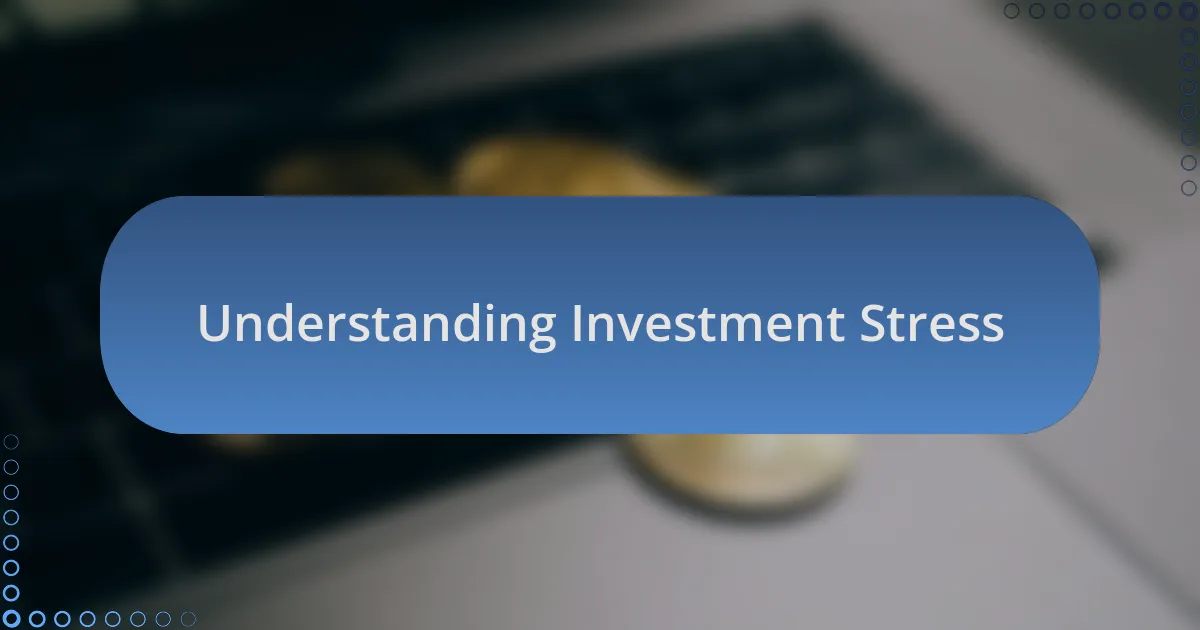
Understanding Investment Stress
Investment stress is a familiar feeling, especially in the unpredictable world of crypto. I remember a particularly turbulent time when I invested heavily in Ethereum right before a major price crash. The anxiety that swept over me was overwhelming—did I make the right choice, or was I chasing a fleeting dream?
Understanding investment stress requires recognizing its triggers. For instance, market volatility often sparks concern, which can lead to hasty decisions driven by fear rather than logic. Have you ever found yourself checking your portfolio multiple times a day? It’s easy to let emotions dictate your actions when you’re constantly bombarded with updates. That’s a sure recipe for additional stress.
What’s important is to acknowledge that stress can manifest in different ways, from sleepless nights to a nagging worry that affects daily life. Personally, I found that talking about my fears with fellow investors helped alleviate some of that pressure. How do you handle such stress? It’s a critical question that might lead you to discover your own coping mechanisms.

Importance of Crypto Analysis Engine
The significance of a Crypto Analysis Engine cannot be overstated, particularly when you are navigating market fluctuations. I once relied solely on gut feelings to make investment decisions, only to realize that a lack of analytics can lead to costly mistakes. The engine, with its data-driven insights, provides a solid foundation for informed decision-making, easing the tension that often accompanies trading.
Having access to comprehensive data and analytical tools allows investors to understand market trends and potential risks better. I recall feeling overwhelmed by the sheer amount of information available; it was like trying to drink from a firehose. But once I started using a Crypto Analysis Engine, everything changed. Suddenly, I had clarity in the chaos. Isn’t it reassuring to have concrete data to support your trading strategies?
Moreover, the Crypto Analysis Engine helps bridge the gap between emotional reactions and rational strategies. When prices dip, it’s easy to panic, but with thorough analysis at hand, I found myself more capable of staying calm and sticking to my plan. It makes me wonder how many others would benefit from this approach—what if we could all cultivate a level-headed perspective through data?
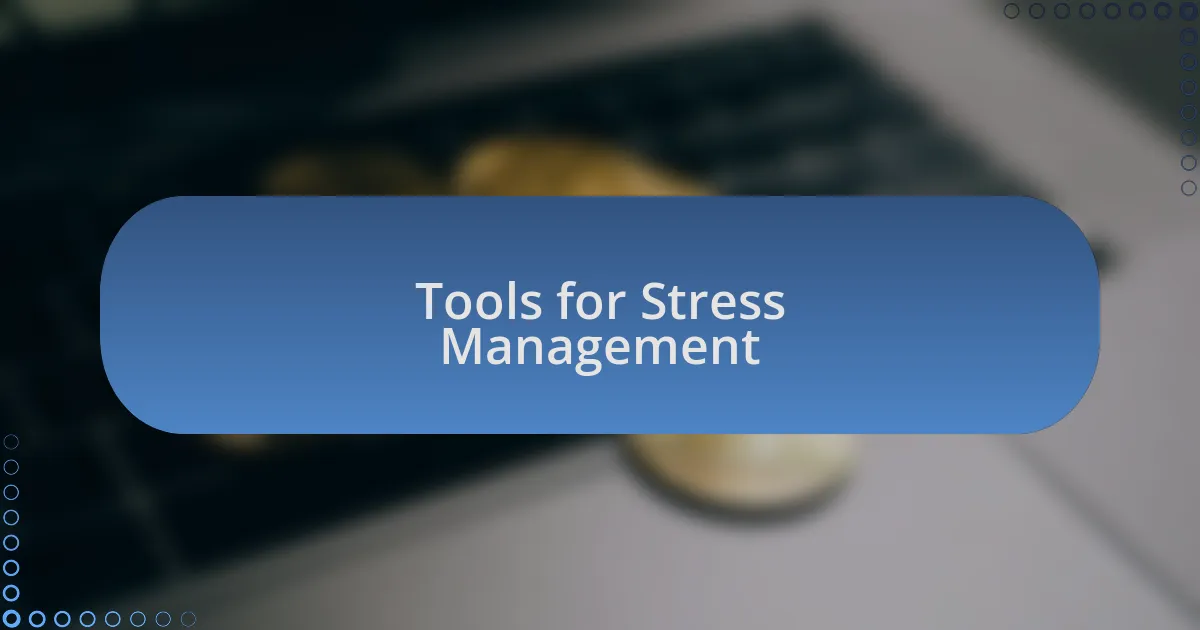
Tools for Stress Management
When it comes to managing stress in the ever-volatile crypto market, I’ve found that mindfulness techniques play a vital role. I remember a particularly grueling week when prices dropped dramatically, stirring anxiety within me. Taking a few moments each day to practice deep breathing or meditation helped me regain focus, allowing me to tune into my emotions rather than let them dictate my actions. Isn’t it fascinating how just a few quiet moments can shift our mindset?
In addition to mindfulness, employing trading journals has been a game changer for me. I started documenting my thoughts and feelings surrounding each investment decision, which has truly helped me reflect on my patterns. There was a time I felt a surge of panic following a loss, but writing it down helped me analyze the situation without judgment and identify my triggers. Do you think having a record of your emotional responses might illuminate your own stressors?
Lastly, taking breaks from market monitoring is essential for preserving mental well-being. I’ve made it a habit to step away and engage in hobbies or physical activity. One afternoon, after spending too long fixated on charts, I took a walk outdoors. This small change in scenery cleared my head and gave me a fresh perspective when I returned. Have you ever noticed how a change of pace can provide clarity in the midst of chaos?
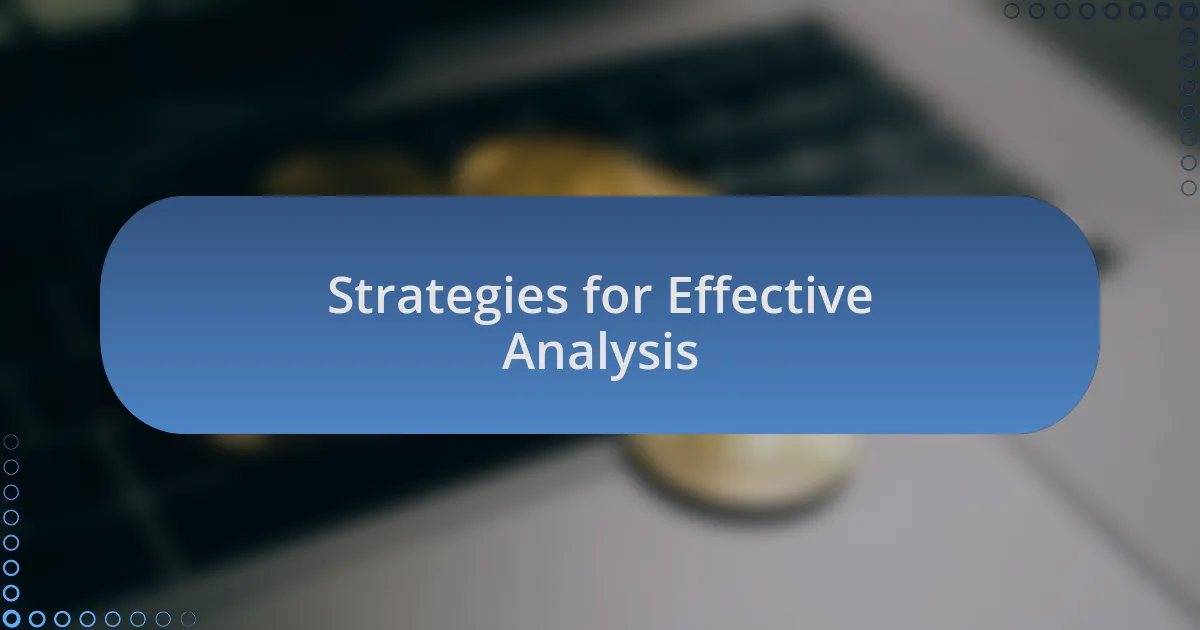
Strategies for Effective Analysis
Effective analysis starts with data integrity. I’ve always prioritized using reliable sources for my market research. For instance, I recall a time when I relied on an unverified prediction and lost a significant sum. Since then, I’ve learned to cross-check information and rely on established platforms. How often do you question the sources of your data?
In parallel, developing a structured approach to analyzing market trends has proven beneficial. I often map out my observations in a simple spreadsheet. This method allows me to visualize patterns and spot potential opportunities more clearly. There was a moment when I identified a rising trend just by organizing my thoughts. Have you tried putting your ideas on paper to reveal new insights?
Lastly, I’ve found that collaborating with fellow investors elevates my analysis. A casual chat with a knowledgeable friend once led to a deeper understanding of market volatility. Their perspective offered a fresh angle on a situation I had been stuck on. Could sharing your thoughts with others bring additional clarity to your investment strategies?
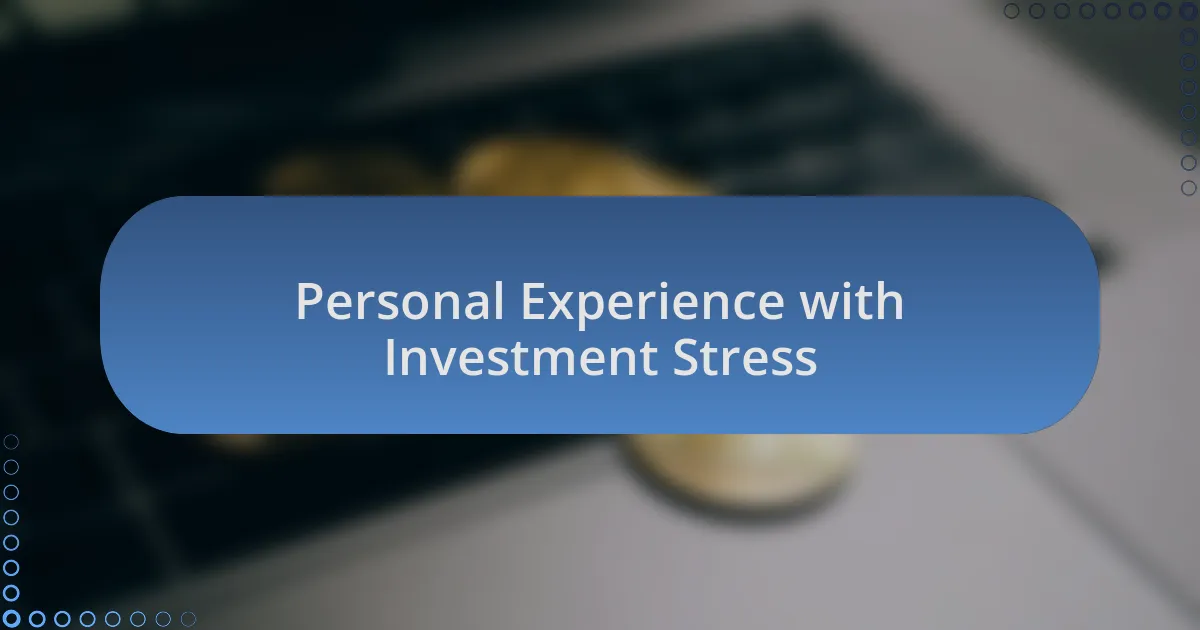
Personal Experience with Investment Stress
Investment stress is something I know all too well. I vividly remember a period when the market took a sharp downturn. My heart raced as I watched my portfolio shrink. I felt an overwhelming urge to react immediately. But instead of panicking, I took a moment to breathe and assess the situation. How many of us have acted on impulse during stressful times, only to regret it later?
There was another instance when I found myself losing sleep over a potential investment. I had crunched the numbers and felt confident, yet doubt crept in. I still recall sitting on my couch at 2 AM, staring at my screen, questioning my choices. It made me realize that mental clarity is crucial. Now, I prioritize a good night’s sleep and avoid making decisions at odd hours. Have you ever let doubt overshadow your confidence in an investment?
Over time, I’ve learned that addressing investment stress means acknowledging my feelings. One unexpected tactic has been journaling my thoughts and emotions related to my trades. I remember a particularly tough week when I wrote about my fears and hopes. That simple practice helped to lighten my mental load by providing a safe space to process my feelings. What if putting your thoughts on paper could ease your worries too?
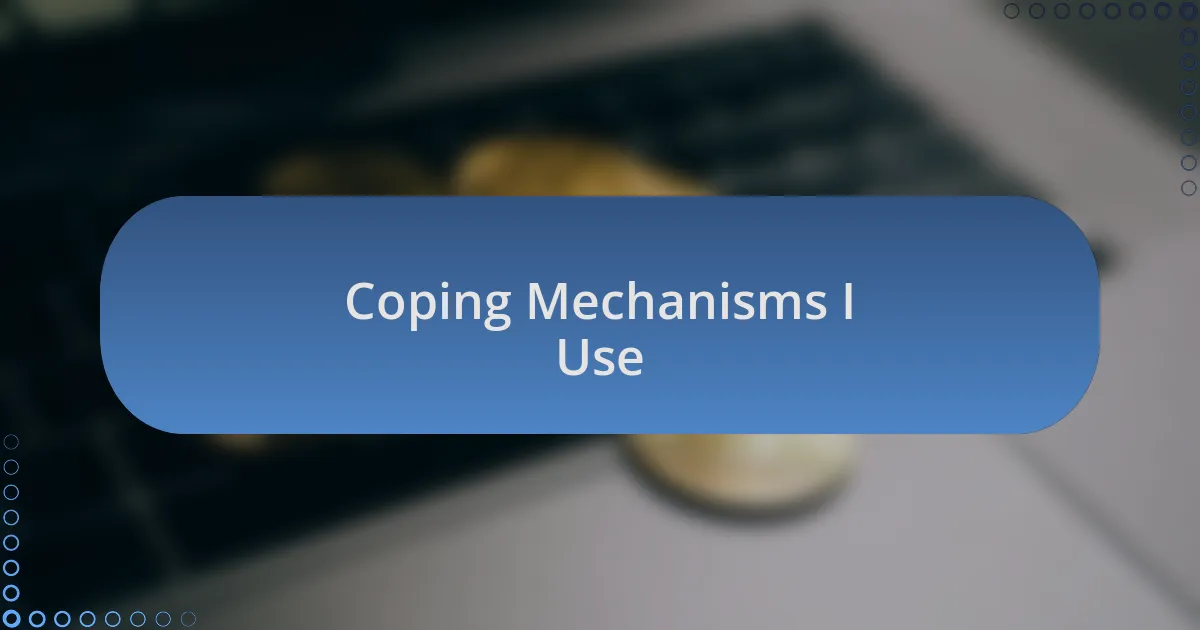
Coping Mechanisms I Use
Managing investment stress effectively has led me to adopt a few unconventional coping mechanisms. For instance, I often step away from my screens and embrace nature. On particularly volatile days, I’ve found solace in long walks or even just sitting in the park, allowing the sights and sounds around me to ground my thoughts. Isn’t it fascinating how a change in environment can help clear the clutter in our minds?
Another method that works wonders for me is engaging with a trusted community of fellow investors. There have been countless evenings when I’ve joined online forums to share my concerns or celebrate victories. The camaraderie has always been uplifting, and discussing shared experiences often helps me gain perspective. Have you ever noticed how talking to someone who understands your situation can provide that spark of clarity you might be searching for?
Lastly, I find that incorporating mindfulness and meditation into my routine is invaluable. When anxiety feels overwhelming, I spend just a few minutes focusing on my breath. I recall a particularly tense moment when I used deep breathing techniques to center myself before making a crucial investment decision. The difference it made was profound; I was calmer, more focused, and able to think critically. What if dedicating even five minutes each day to mindfulness could transform your approach to stress?
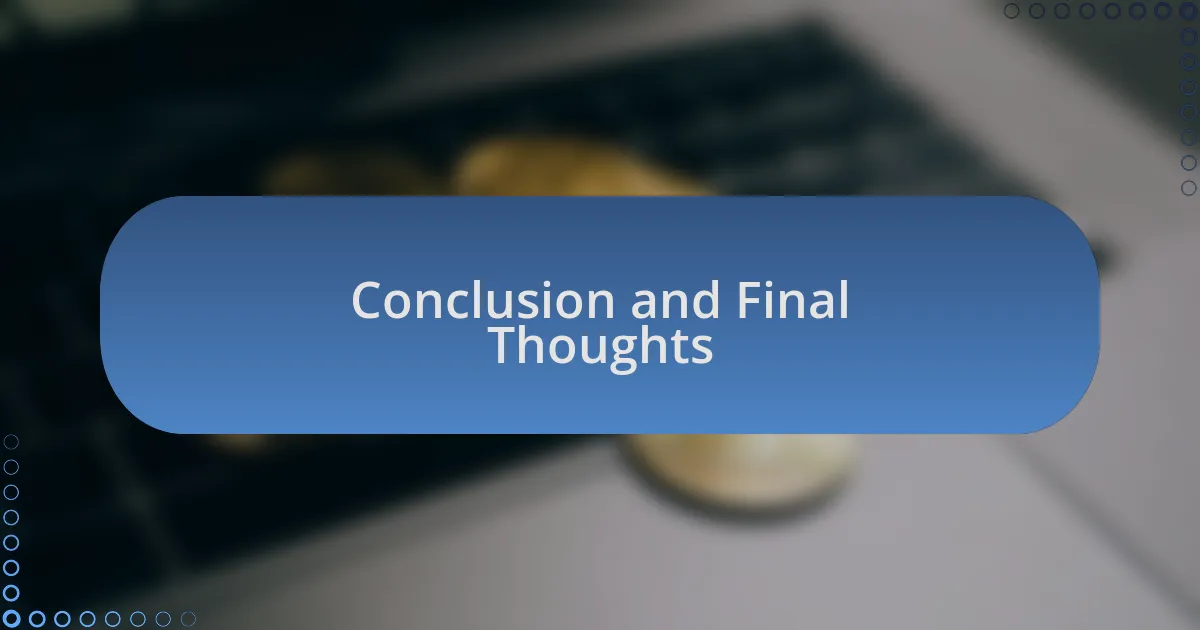
Conclusion and Final Thoughts
Finding balance amidst investment stress is crucial for long-term success. I’ve learned that taking a moment to acknowledge my emotions can make a significant difference. For instance, during a particularly tumultuous market phase, I wrote down my feelings. This act of journaling not only helped me to process my anxiety but also offered clarity on my investment goals. Have you ever tried documenting how you feel during market swings? It was a revelation for me.
Reflecting on these strategies, I realize that resilience is a skill cultivated through practice. When I embraced these mechanisms, I transformed my perception of stress from a hindrance to a valuable teacher. I still remember feeling once unsure about whether to invest further during a downturn. Instead of panicking, reminding myself of my strategies guided my decisions. Isn’t it empowering to feel in control amidst chaos?
Ultimately, everyone experiences investment stress differently, and finding your unique coping mechanisms is key. I encourage you to explore various techniques, just as I did, even if it means stepping outside your comfort zone. The idea that we have the power to shape our responses can turn stressful moments into opportunities for growth. So, what will you try to ease your own investment stress?